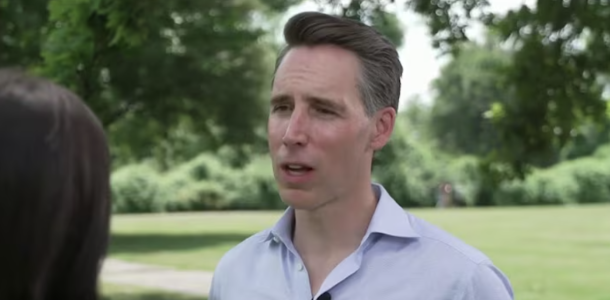He voted for Trump’s tax law—now this GOP senator wants to undo its Medicaid cuts. What changed?
- Replies 0
Politics is full of twists, turns, and—let’s be honest—a fair share of head-scratchers.
But even by Washington standards, what’s happening with a senator and the Trump-era tax law is a real doozy.
If you’ve been following the headlines, you might be wondering: Why is a senator who just voted for a law now scrambling to undo a big part of it?
Among its many provisions, the law included significant changes to Medicaid—the federal-state program that provides health coverage to millions of low-income Americans, including many older adults and people with disabilities.
One of the most controversial changes? The law would force states to reduce their so-called “provider taxes”—special taxes on hospitals and other health providers that states use to draw down more federal Medicaid dollars.
The new law lowers the cap on these taxes from 6% to 3.5% over the next few years.
For many states, especially those with large rural populations, that’s a big deal. These provider taxes are a lifeline for struggling hospitals, particularly in rural areas where every dollar counts.

Here’s where things get interesting. Senator Josh Hawley, a Republican from Missouri, voted in favor of the Trump tax law—including the Medicaid cuts.
But just two weeks later, he introduced a new bill—the “Protect Medicaid and Rural Hospitals Act”—to repeal those very cuts.
Not only that, but his bill would double the funding for rural hospitals from $50 billion to $100 billion and extend that support from five years to ten.
So, what gives? Why the sudden about-face?
More on News & Politics: Overdraft alert: how the latest law will change fees at big banks—and how your account is affected
To understand Hawley’s move, you have to look at the bigger picture.
Rural hospitals across America are in crisis. Over 130 rural hospitals have closed since 2010, and hundreds more are at risk.
In states like Missouri, these hospitals are often the only source of emergency care for miles around. When they close, entire communities lose access to lifesaving services.
Hawley has long positioned himself as a champion of rural America. During the Senate debate, he was one of the most vocal Republicans warning against Medicaid cuts.
But with party leaders pushing hard for the tax bill, Hawley ultimately voted yes—perhaps betting that he could fight for changes after the fact.
Now, with the ink barely dry on the new law, Hawley is making good on that promise.
“President Trump has always said we have to protect Medicaid for working people. Now is the time to prevent any future cuts to Medicaid from going into effect,” he said in a statement.
He also pointed out that Missouri hospitals stand to gain an extra $1 billion over the next four years under the new rural health fund—but only if those Medicaid cuts are stopped.
Of course, not everyone is buying Hawley’s explanation. Democratic Senator Chris Coons of Delaware summed up the skepticism on social media: “Just so I’m clear… he’s introducing a bill….to repeal the bill… he voted for….two weeks ago?”
It’s a fair question, and one that highlights the sometimes dizzying back-and-forth of Washington politics.
But Hawley isn’t alone in his concerns. Many lawmakers—on both sides of the aisle—are feeling the heat from hospitals, patients, and advocacy groups worried about the impact of Medicaid cuts.
The reality is, Medicaid is a lifeline for millions, and any threat to its funding is bound to spark a backlash.
People between 19 and 64 will have to prove they’re working at least 80 hours a month to keep their benefits.
Supporters say this will encourage self-sufficiency; critics argue it could push vulnerable people off the rolls, especially in areas with few job opportunities.
More on News & Politics:Is your Social Security data safe? Cybersecurity failures put US Social Security data at risk
The outcome could affect everything from your local hospital’s ability to keep its doors open to your own access to doctors, specialists, and emergency care.
Here at TheGrayVine, we know that many of our readers have firsthand experience with the challenges of rural healthcare.
Maybe you’ve seen a local hospital close, or struggled to find a provider who accepts Medicaid. Maybe you’re worried about what these changes could mean for your family, friends, or neighbors.
In the meantime, expect more lawmakers to weigh in—and more pressure from hospitals, patient groups, and voters.
Also read: Bigger benefits, smaller payoff? Medicare costs may cut into your next Social Security raise

We want to hear from you! Have you or someone you know been affected by changes to Medicaid or rural hospital funding? Do you think lawmakers are doing enough to protect healthcare in your community? What would you like to see happen next?
But even by Washington standards, what’s happening with a senator and the Trump-era tax law is a real doozy.
If you’ve been following the headlines, you might be wondering: Why is a senator who just voted for a law now scrambling to undo a big part of it?
A Quick Recap: The Trump Tax Law and Medicaid
Earlier this month, President Trump’s sweeping tax and domestic policy law made its way through Congress.Among its many provisions, the law included significant changes to Medicaid—the federal-state program that provides health coverage to millions of low-income Americans, including many older adults and people with disabilities.
One of the most controversial changes? The law would force states to reduce their so-called “provider taxes”—special taxes on hospitals and other health providers that states use to draw down more federal Medicaid dollars.
The new law lowers the cap on these taxes from 6% to 3.5% over the next few years.
For many states, especially those with large rural populations, that’s a big deal. These provider taxes are a lifeline for struggling hospitals, particularly in rural areas where every dollar counts.

Two weeks after backing Medicaid cuts in the Trump tax law, Senator Josh Hawley proposed a bill to repeal them. Image source: NBC News / YouTube
Enter Senator Hawley: A Change of Heart?
Here’s where things get interesting. Senator Josh Hawley, a Republican from Missouri, voted in favor of the Trump tax law—including the Medicaid cuts.
But just two weeks later, he introduced a new bill—the “Protect Medicaid and Rural Hospitals Act”—to repeal those very cuts.
Not only that, but his bill would double the funding for rural hospitals from $50 billion to $100 billion and extend that support from five years to ten.
So, what gives? Why the sudden about-face?
More on News & Politics: Overdraft alert: how the latest law will change fees at big banks—and how your account is affected
Politics, Pressure, and the Plight of Rural Hospitals
To understand Hawley’s move, you have to look at the bigger picture.
Rural hospitals across America are in crisis. Over 130 rural hospitals have closed since 2010, and hundreds more are at risk.
In states like Missouri, these hospitals are often the only source of emergency care for miles around. When they close, entire communities lose access to lifesaving services.
Hawley has long positioned himself as a champion of rural America. During the Senate debate, he was one of the most vocal Republicans warning against Medicaid cuts.
But with party leaders pushing hard for the tax bill, Hawley ultimately voted yes—perhaps betting that he could fight for changes after the fact.
Now, with the ink barely dry on the new law, Hawley is making good on that promise.
“President Trump has always said we have to protect Medicaid for working people. Now is the time to prevent any future cuts to Medicaid from going into effect,” he said in a statement.
He also pointed out that Missouri hospitals stand to gain an extra $1 billion over the next four years under the new rural health fund—but only if those Medicaid cuts are stopped.
A Dose of Political Theater?
Of course, not everyone is buying Hawley’s explanation. Democratic Senator Chris Coons of Delaware summed up the skepticism on social media: “Just so I’m clear… he’s introducing a bill….to repeal the bill… he voted for….two weeks ago?”
It’s a fair question, and one that highlights the sometimes dizzying back-and-forth of Washington politics.
But Hawley isn’t alone in his concerns. Many lawmakers—on both sides of the aisle—are feeling the heat from hospitals, patients, and advocacy groups worried about the impact of Medicaid cuts.
The reality is, Medicaid is a lifeline for millions, and any threat to its funding is bound to spark a backlash.
What Else Is in the Law?
The Trump tax law doesn’t just target provider taxes. It also introduces new work requirements for able-bodied adults on Medicaid, set to take effect in 2026.People between 19 and 64 will have to prove they’re working at least 80 hours a month to keep their benefits.
Supporters say this will encourage self-sufficiency; critics argue it could push vulnerable people off the rolls, especially in areas with few job opportunities.
More on News & Politics:Is your Social Security data safe? Cybersecurity failures put US Social Security data at risk
What Does This Mean for You?
If you live in a rural area, rely on Medicaid, or care about access to healthcare in your community, this debate is more than just political theater—it’s personal.The outcome could affect everything from your local hospital’s ability to keep its doors open to your own access to doctors, specialists, and emergency care.
Here at TheGrayVine, we know that many of our readers have firsthand experience with the challenges of rural healthcare.
Maybe you’ve seen a local hospital close, or struggled to find a provider who accepts Medicaid. Maybe you’re worried about what these changes could mean for your family, friends, or neighbors.
What Happens Next?
Hawley’s bill is just the beginning. It will need to make its way through Congress, where it’s sure to face plenty of debate.In the meantime, expect more lawmakers to weigh in—and more pressure from hospitals, patient groups, and voters.
Also read: Bigger benefits, smaller payoff? Medicare costs may cut into your next Social Security raise
Key Takeaways
- Republican Senator Josh Hawley has introduced a bill to repeal some Medicaid cuts in President Trump’s new tax law, despite having voted to pass the original legislation earlier this month.
- The bill, called the “Protect Medicaid and Rural Hospitals Act,” seeks to stop planned reductions in provider tax limits and proposes to double funding for rural hospitals from $50 billion to $100 billion, extending support from five to ten years.
- The Trump law also introduces new work requirements for Medicaid recipients aged 19 to 64, who will have to work at least 80 hours per month to keep their benefits from 2026.
- Hawley’s move has drawn criticism, with some pointing out the contradiction of introducing a bill to undo the very cuts he recently voted for, while he argues it’s necessary to protect Medicaid and rural hospitals.
Last edited:






